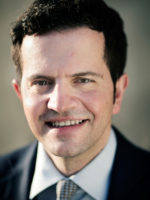
Giuseppe Mazziotti is a 2018/2019 EU Fulbright Scholar and an Emile Noël Global Fellow at New York University (NYU) School of Law. He is an Assistant Professor in intellectual property law at Trinity College Dublin (on leave). Giuseppe specializes in copyright, media law, antitrust and information technology law, data protection, EU law and cultural policies. From 2009 to 2011 he was an Assistant Professor of intellectual property law at the University of Copenhagen. Giuseppe was Visiting Scholar at the University of California, Berkeley (2004/2005), Columbia Law School, New York (2010/2011), Pompeu Fabra University (2017) and ESADE Business School, Barcelona (2017). He was a Fellow of the Berkman Center for Internet and Society at Harvard University (2011/2012), the Istituto de Technologia e Sociedade, Rio de Janeiro (2015) and the Centre for Media Pluralism and Freedom at the European University Institute in Florence (2017). Giuseppe is an Associate Fellow at the Centre for European Policy Studies (CEPS) in Brussels, where he co-managed the CEPS Digital Forum from August 2012 until December 2013, leading a multi-stakeholder task force on ‘Copyright in the Digital Single Market’. Prior to joining CEPS, he advised IFPI (Representing the Recording Industry Worldwide), the European Commission (DG CONNECT), the European Parliament (DG for Internal Policies) and the Italian Ministry for Cultural Heritage and Activities on various projects concerning intellectual property law and information technology. From 2007 to 2012 he practised law as associate and counsel at Nunziante Magrone (Rome). Since December 2012, he has worked as an independent consultant advising individual authors and performers, content producers, start-ups and Internet and media companies. Giuseppe holds a cum laude law degree (2001) from the University of Perugia, a Master of Research (2003) and a PhD in Law (2007) from the European University Institute in Florence and master degrees in clarinet performance (1997) and chamber music (2003) from the Music Conservatory of Perugia.